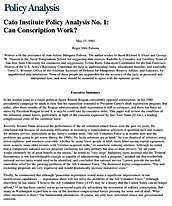In his sixteen years as a major political figure Ronald Reagan consistently opposed conscription. In his 1980 presidential campaign he made it clear that his opposition extended to President Carter’s draft registration program. But today, after three months of the Reagan administration, draft registration is still in existence, and there has been no move by President Reagan to end it, a step he could take by executive order. This paper will review the condition of the volunteer armed forces, particularly in light of the concerns expressed by Sen. Sam Nunn (D‑Ga.), a leading congressional critic of the volunteer force.
Recently Senator Nunn reviewed the performance of the all-volunteer armed forces over the past six years. He concluded that because of increasing difficulties in recruiting a representative selection of qualified men and women for military service, particularly in the Army’s combat arms, “the All-Volunteer Force is in trouble now and the problems are going to get worse during the 1980s. No facile solutions are at hand.” he was skeptical of solutions using fewer eighteen- and nineteen-year-olds, whether by using fewer people in total, more labor-saving capital equipment, more women, more older recruits with “civilian-acquired skills,” or somehow reducing attrition. Although he stated that a compulsory national service program (including not only military but also civilian service) “for all youth … would ultimately be of great benefit to the nation,” he noted its “very large” budgetary costs, asserted that the “Federal bureaucracy is not knowledgeable enough or capable of administering such a program,” pointed out that worthwhile national service tasks would need to be identified, and concluded that national service “cannot provide the needed, immediate relief for the growing problems of the All-Volunteer Force.” He dismissed higher compensation: “Pay and recruiting proposals are very expensive and would dramatically increase manpower costs.”
Finally, he commented that although “peacetime registration would make a significant improvement in our mobilization capabilities … registration alone will not solve the problems of the All-Volunteer Force.” Although elsewhere he has stated “I believe the All-Volunteer Force (AVF) may be a luxury that the United States can no longer afford,” [2] he has been careful not to go on record explicitly advocating the restoration of military conscription. But many in Washington regard him as one of the foremost congressional forces pressing for some sort of draft. What other alternative is there? The fundamental alternatives, of course, are only two: individual choice and governmental coercion.
Certainly coercion is morally objectionable. Indeed, we Americans fought a civil war over the issue of compulsory labor. For most Americans that war, and the Thirteenth Amendment to the Constitution which followed it, outlawed involuntary servitude. Yet what is military conscription if not involuntary servitude, a condition totally inimical to the principles of the American Revolution as well as the Civil War? It should be clear that conscription is inconsistent with the principles of a free society.
But however one views the issue of coercion, it should also be clear that conscription is not in any sense necessary to American national security, and our purpose here is to counter Senator Nunn’s implicit argument for coercion with additional information. Revisions in the structure of military compensation, together with other management changes, can solve the manpower quantity and quality problems outlined by Senator Nunn without increasing real manpower costs at all.
About the Author

This work is licensed under a Creative Commons Attribution-NonCommercial-ShareAlike 4.0 International License.
